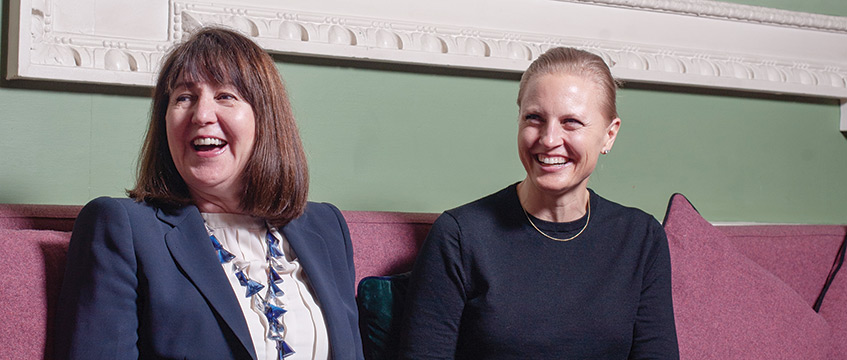Finding balance: the importance of men in gender diversity
Real Estate Balance is on a mission. It wants to balance this industry. It wants women to play just as important as a role in it as men. And to do that it needs men to be involved in the discussion. It needs the men who currently sit at the top of many of the businesses in this industry to lean in. To really understand.
And Real Estate Balance has got a not-so-secret weapon to help it on its journey to achieve that: former head of commercial at Landsec Kaela Fenn-Smith (pictured right) is smart, charming, dedicated and unafraid to tell it how it is. Which makes her the perfect managing director to sit along Real Estate Balance chair Vivienne King (pictured left).
The pair caught up with EG to discuss just how Real Estate Balance is focused on action, on providing the tools and inspiring confidence for all businesses across the real estate universe to level the sector.
Real Estate Balance is on a mission. It wants to balance this industry. It wants women to play just as important as a role in it as men. And to do that it needs men to be involved in the discussion. It needs the men who currently sit at the top of many of the businesses in this industry to lean in. To really understand.
And Real Estate Balance has got a not-so-secret weapon to help it on its journey to achieve that: former head of commercial at Landsec Kaela Fenn-Smith (pictured right) is smart, charming, dedicated and unafraid to tell it how it is. Which makes her the perfect managing director to sit along Real Estate Balance chair Vivienne King (pictured left).
The pair caught up with EG to discuss just how Real Estate Balance is focused on action, on providing the tools and inspiring confidence for all businesses across the real estate universe to level the sector.
King says Real Estate Balance came about just over two-and-a-half years ago, when she and six other women started wondering why there were so few other women in senior positions in the industry and what they had done to get to their level of seniority. There were – and are – plenty of groups out there focused on promoting women, but the numbers still remained unimpressive. Why wasn’t change happening? What wasn’t being done that needed to be done?
“We identified a few issues that weren’t properly being addressed,” says King, “and one of those was that they weren’t discussing this topic with men sufficiently, especially given that most of the positions in the industry at senior level are held by men.
“It is obvious that men need to be part of the discussion. Women know what the issues are but men don’t. We needed to be having those conversations with men at senior levels at the same time as looking at how we would support women who were coming through in their careers to enable them to make the transition into senior positions.”
Inclusion
When you think about diversity in terms of individual groups, it is very easy to forget that the most powerful part of diversity is the inclusion. There will always be moments when it is important for a group to be able to talk among itself, to feel safe and free in that group, but the issues that are raised in those groups need to be shared outside them. They need to be included in the wider community if they are to be addressed and solved.
For Fenn-Smith, addressing and solving those issues – or at least the issue of there being a lack of women in senior roles in real estate – comes in the form of making gender diversity a business issue, not a women’s issue.
“Having been a senior woman in a FTSE 100 company, I know there are challenges and I wanted to make the corporate workplace better,” says Fenn-Smith, explaining her move to Real Estate Balance.
“One of the things that I would love to change in this role – or help change perspective on – is how men are viewing this issue. What we are talking about that is better for women is actually better for everybody, so the changes we need to make in business that can accommodate women coming through to the senior levels are just as important for men coming through.”
She adds: “This is really how businesses need to think about doing business for their people in the future. This isn’t just a woman’s issue. It needs to talk to both men and women and we need to stand side by side, shoulder to shoulder with men in this initiative.”
Survival
For Fenn-Smith, diversity in real estate is vital for survival of the sector.
“The greatest thing about property and the real estate sector is that it is everywhere, it affects and it touches everybody – from homes to public transport, to schools, to office buildings, shopping centres. It touches the lives of the entire population. If we are designing and building and creating all these spaces for the world outside, how on earth can we understand our customer and build the right product, design it, make it future-proof, deal with disruption, deal with people of the future generations to come, if we are coming from a single point of view?
“It’s not realistic and it’s not sustainable for businesses to continue down that path if they want to survive in the future in this sector. This is becoming business critical. This isn’t just a wish list or how to get the right talent any more. This is a business-critical issue.”
And King is confident that with 70 businesses from across the sector as fully signed up members of Real Estate Balance, the importance of this issue is going to hit home. Through those corporate members, Real Estate Balance has access to around 900 employees. As their businesses have signed up to the commitments of Real Estate Balance, those employees can be the gatekeepers of diversity, the conscience of their firm’s chief executive.
“What they need to be doing is ensuring that those companies are stepping up to the plate and working with Real Estate Balance to change the industry,” says King. “And if anyone’s in an organisation that isn’t a member of a Real Estate Balance, then they need to be asking why? And that’s not just women, that’s men as well, because we are just one aspect of diversity and if you start to get one aspect right then the chances are that you are making inroads across the board.”
“I think if you don’t already know the benefits of diversity, you need to try to understand the business case,” adds Fenn-Smith. “Understand the business case and really start to ask yourself what kind of a business do you want now and in the future? Is your business aligning itself to the change that has to happen for you to survive? Then take it forward by making it a strategic priority.”
The business case for diversity is simple and easily found by a quick Google search. Research abounds on how much more profitable businesses are when they have a diversity leadership team. The key now is to turn that research into real life, to put into practice the key lessons being taught around diversity and inclusion and to balance real estate.
REB’s 10 commitments
More than 70 chief executives from across the real estate sector have signed up the 10 Real Estate Balance commitments:
Visibly demonstrate the business case for diversity and promote your commitment within your business.
Gather your diversity data, track and report your progress, using your data to guide your priorities.
Change mindsets by challenging bias/discrimination wherever you see it and license others to do the same.
Insist on diversity for recruitment or promotion decisions you are involved with, including on panels and in shortlists.
Use promotional opportunities for your company to represent a diverse image.
Speak on panels only where organisers commit to having at least one man and one woman.
Adopt a balanced approach to sponsorship – that is, both men and women.
Consider influencing your supply chain.
Personally engage with the diverse range of the workforce in your business in order to broaden your perspective.
Promote D&I in any groups you are members of and share good practice.
REWIRE Podcasts
Listen to the interview with Real Estate Balance’s Vivienne King and Kaela Fenn-Smith by searching EG REWIRE on any of your favourite podcast channels, including Apple Podcasts, Spotify and Podbean.
To send feedback, e-mail samantha.mcclary@egi.co.uk or tweet @samanthamcclary or @estatesgazette











